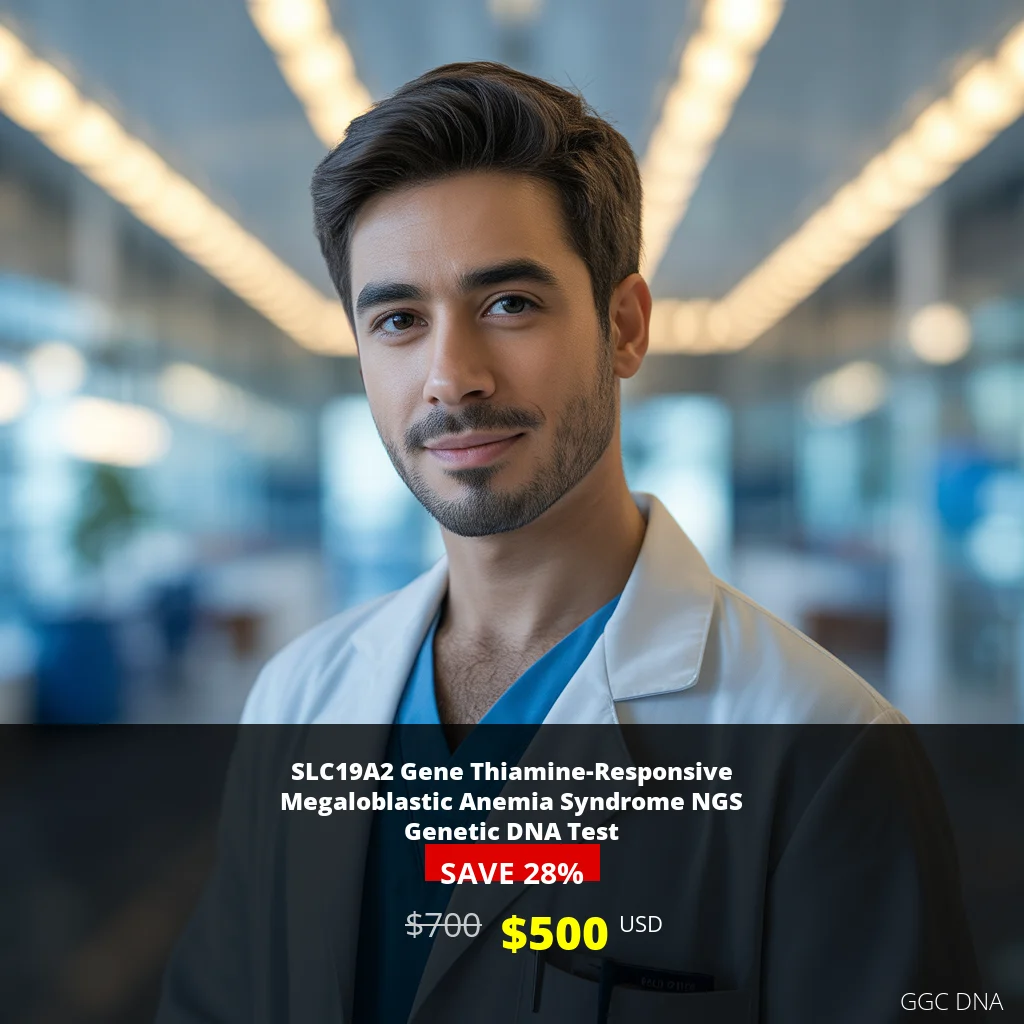SLC19A2 Gene Thiamine-Responsive Megaloblastic Anemia Syndrome NGS Genetic DNA Test
Comprehensive Genetic Testing for Rare Anemia Disorders
The SLC19A2 Gene Thiamine-Responsive Megaloblastic Anemia Syndrome NGS Genetic DNA Test represents a breakthrough in genetic diagnostics for rare hematological conditions. This advanced test specifically targets mutations in the SLC19A2 gene, which encodes a high-affinity thiamine transporter protein essential for cellular thiamine uptake. When this gene malfunctions, it leads to thiamine-responsive megaloblastic anemia (TRMA) syndrome, a rare autosomal recessive disorder that manifests with a distinctive triad of symptoms: megaloblastic anemia, diabetes mellitus, and sensorineural deafness.
What This Test Measures and Detects
Our NGS-based genetic test provides comprehensive analysis of the SLC19A2 gene to identify pathogenic variants responsible for TRMA syndrome. The test specifically detects:
- Point mutations, insertions, and deletions in the SLC19A2 gene
- Missense, nonsense, and frameshift mutations affecting thiamine transport
- Genetic variants that impair thiamine uptake in various tissues
- Inheritance patterns through family genetic analysis
- Carrier status identification in unaffected family members
Who Should Consider This Test
This genetic test is recommended for individuals presenting with the following symptoms or clinical scenarios:
- Children or adults with unexplained megaloblastic anemia unresponsive to conventional treatments
- Individuals diagnosed with diabetes mellitus at an early age (typically childhood or adolescence)
- Patients experiencing progressive sensorineural hearing loss
- Family members of individuals diagnosed with TRMA syndrome
- Cases where standard anemia treatments have proven ineffective
- Patients with the characteristic triad of anemia, diabetes, and hearing impairment
Key Benefits of Genetic Testing
Undergoing the SLC19A2 genetic test provides numerous clinical advantages:
- Accurate Diagnosis: Confirms TRMA syndrome with high specificity, eliminating diagnostic uncertainty
- Targeted Treatment: Enables appropriate thiamine supplementation therapy based on genetic findings
- Family Planning: Provides crucial information for genetic counseling and family planning decisions
- Early Intervention: Facilitates timely treatment initiation to prevent disease progression
- Comprehensive Care: Supports multidisciplinary management involving hematologists, endocrinologists, and audiologists
Understanding Your Test Results
Our comprehensive genetic report provides clear interpretation of your results:
- Positive Result: Identifies pathogenic mutations in the SLC19A2 gene, confirming TRMA syndrome diagnosis and guiding thiamine therapy
- Negative Result: No disease-causing mutations detected, helping to rule out TRMA syndrome and direct investigation toward other causes
- Variant of Uncertain Significance: Identifies genetic changes with unclear clinical impact, requiring further evaluation and possibly family studies
- Carrier Status: Identifies individuals carrying one copy of the mutated gene who are typically asymptomatic but can pass the condition to offspring
Test Information and Pricing
| Test Parameter | Details |
|---|---|
| Test Name | SLC19A2 Gene Thiamine-Responsive Megaloblastic Anemia Syndrome NGS Genetic DNA Test |
| Regular Price | $700 USD |
| Discount Price | $500 USD |
| Turnaround Time | 3 to 4 Weeks |
| Sample Type | Blood, Extracted DNA, or One Drop Blood on FTA Card |
| Testing Method | Next-Generation Sequencing (NGS) Technology |
Nationwide Testing Availability
We have diagnostic centers conveniently located across the United States, including major metropolitan areas such as New York, Los Angeles, Chicago, Houston, Phoenix, Philadelphia, San Antonio, San Diego, Dallas, and San Jose. Our state-of-the-art facilities ensure consistent, high-quality testing standards nationwide.
Take the Next Step Toward Diagnosis
If you or a family member are experiencing symptoms suggestive of thiamine-responsive megaloblastic anemia syndrome, don’t delay in seeking genetic clarification. Our comprehensive SLC19A2 genetic test provides the definitive answers needed for proper diagnosis and targeted treatment. Early identification of TRMA syndrome can significantly improve clinical outcomes through appropriate thiamine supplementation.
Call us today at +1(267) 388-9828 to schedule your genetic counseling session and book the SLC19A2 Gene Thiamine-Responsive Megaloblastic Anemia Syndrome NGS Genetic DNA Test. Our genetic specialists are ready to guide you through the testing process and help you understand your results.







